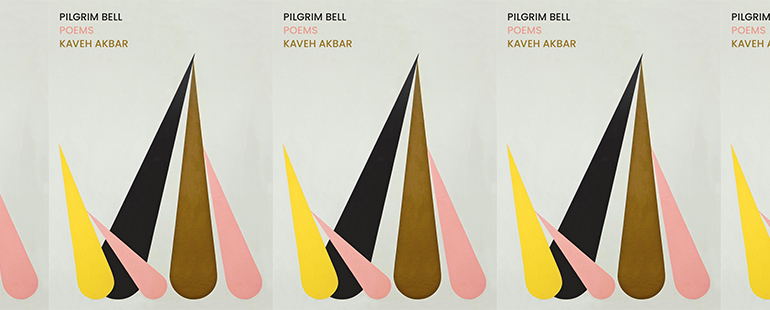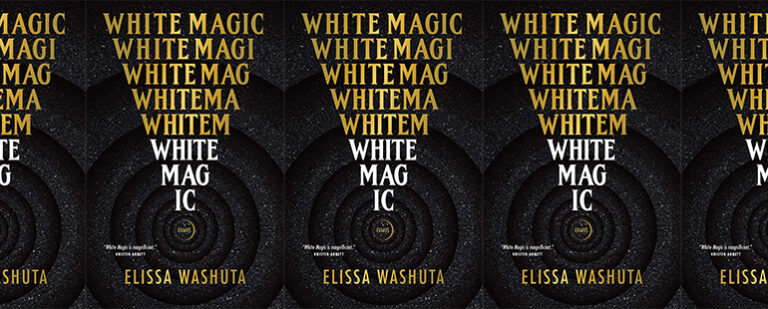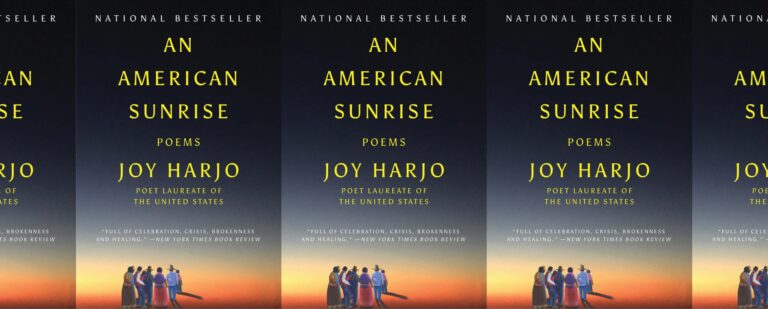The Interfaith Poetics of Pilgrim Bell

I have been carrying around a copy of Kaveh Akbar’s Pilgrim Bell, out this month, during a season of dread. I read it in between conversations about whether it will be safe to send my children to school this year and phone calls with family about breakthrough COVID-19 cases. I read it again on the one-year anniversary of my grandpa’s death, my body inflamed with grief- and stress-amplified chronic pain. I read it in breaks from scraping peeling window frames and stirring brown semigloss paint, relieved to have a concrete task. I read it after trying to pray and finding words useless amid the swirling losses and unknowns. Akbar’s book met me in these spaces, singing true songs about pain and fear.
In the poem “Forfeiting my Mystique,” he writes,
All bodies become sicker
bodies—a kind of object
permanence, a curse bent
around our scalps resembling
grace at only at the tattered
edges.
Yes, I mutter, feeling the deep relief of lines that voice something my flesh mostly knows in silence: both the curse of disease and the tattered edges like grace. The poems, by turns beautiful and brutal, name something of my experience of faith as well. Reading them, I think of lines from Denise Levertov’s “Mass for the Day of St. Thomas Didymus”:
I believe and
interrupt my belief with
doubt. I doubt and
interrupt my doubt with belief. Be,
belovéd, threatened world.
But for as much as Akbar and I share in this beloved, threatened world, including a thick love of poetry and faith cracked open with questions, Pilgrim Bell meets me from across a distance. We are both Americans, yes, but Akbar is a Persian man and I a white woman, Akbar a Muslim and I a Christian. What does it mean for me to recognize my inner life in these poems without eliding the distance between Akbar’s religion and my own, his pain and mine, the sharply distinct ways our bodies, walking on this North American soil, are perceived?
This is a fundamental question of interfaith dialogue, and it’s one the book itself takes up. Akbar highlights tensions of religious and cultural difference early in the collection with the poem “The Miracle,” which tells a story of the angel Gabriel “seizing the illiterate man,” later revealed to be the Prophet, and, through threat and even violence, initiating his literacy. Three paragraphs in, the speaker abruptly addresses the reader or perhaps himself: “Gabriel isn’t coming for you. If he did, would you call him Jibril, or Gabriel like you are here? Who is this even for?”
The sudden shift renders explicit the challenge of readership: the Abrahamic religions share stories of God’s archangel, but “Gabriel” is the Christian rendering of the Hebrew Scriptures’ “Gavri’el.” The poem’s speaker questions his impulse to use this name rather than the Arabic “Jibril,” a question that aligns with the whole collection’s focus on collusions between power and language and the global dominance of the United States, implicitly associated here with the dominance of both English and Christianity.
“One crisis at a time,” the speaker decides, turning away from this tension and using “Gabriel” for the rest of the poem. But again the poem interrupts itself as the next paragraph jumps quite abruptly to a description of drone warfare: “Somewhere a man is steering a robotic plane into murder.” And here is the hard truth, not named but implied and becoming clearer as the collection unfolds: no one is dropping bombs on my hometown. By contrast, Akbar writes in “The Palace,” “people / with living hearts / that could fit in my chest / want to melt the city where I was born.” When I sit with this distance between his experience and mine, I’m left to wonder: am I the poem’s “you” “Too cruel to wonder,” “Too speak to hear,” “Too pride to weep”?
Pilgrim Bell welcomes me with songs of collective personhood—the way our hearts could fit in each other’s chests—even as it calls me to question my false innocence. At points, it goes so far as to shock with images so apt you can almost miss their violence, like the drone pilot who “never sees the bodies, which are implied by their absence. Like feathers on a paper bird.” These formal strategies suggest an ethics of reading predicated on interruption, one that models self-interrogation and the dynamic play of the universal and the particular. For readers who share his sensitivity to the spiritual, Akbar forges an interfaith poetics based on shared humanity and sharply rendered difference, manifested in this ethics of interruption. We find each other, the collection seems to say, in our shared fraught search for the divine, however distinctive our traditions—we recognize each other in the familiar shades of longing and of pain, and we recover in the space of honest accountability to the ways we are variously harmed and harming, wounded and harnessing the forces of personal and political power.
For example: the lines from “Forfeiting my Mystique” about all bodies becoming sicker bodies, which lend themselves to quoted extraction and thus abstraction, arrive between descriptions of “listening / to old home movies” before bed to “force / my brain to dream me / Persian” and a grandfather teaching “his parrot / the ninety-nine holy // names of God.” The universal claim is sandwiched by cultural and religious specificity. This interplay of shared humanity and particularity shapes the whole of Pilgrim Bell, even in its formal diversity. The collection is populated by spare epigrams and poems of varying line lengths and spacing, lyrics and ghazals, short verses and long, with periodic interruptions of Arabic and Farsi that disrupt the supremacy of English. Its themes are personal—stories of family and cultural identity, of sobriety and love—and political, a grappling with Americanness and the slippages of translation, anti-Muslim terror and domineering empire.
Likewise, in the book’s wide range of allusion and reference, Akbar has curated an expansive poetic and spiritual conversation, one that unfolds not in generalizations but in concrete points of reference. Pilgrim Bell gathers an interfaith colloquy on suffering and belief, which should come as no surprise given Akbar’s recent work editing the wide-ranging Penguin Book of Spiritual Verse, due out next spring. The poems in Pilgrim Bell echo Augustine and Rabi’a al-Basri, the Quran and the poet Marwa Helal. Akbar quotes Genesis and the Psalms and Jesus in the desert, Anne Carson and John Donne, Seneca and John Milton, Gertrude Stein and Walter Benjamin and Kamu Braithwaite.
Within this richly populated spiritual conversation, I feel at points like Akbar is whispering directly into my ear, filling up a cup inside me that I didn’t realize was empty. One of the series of poems called “Pilgrim Bell” interspersed through the collection opens with the lines,
My savior has powers and he needs.
To be convinced to use them.
Up until now he has been.
A no-call no-show. Curious menace.
Like a hornet’s nest buzzing.
On a plane wing.
All the “Pilgrim Bell” poems share this disruptive punctuation, refusing enjambments I can’t help assuming just the same. The periods lead to ambiguities: the line “Up until now he has been,” read as a full sentence, suggests the savior has been using his powers. Reading past the end-stop, though, suggests an opposite meaning, that rather than using these powers he’s been “A no-call no-show.”
Looking out at the world’s current state, I can’t help but agree to the divine absence, or at least ambiguity. Later in the poem, Akbar writes, “All day I hammer the distance. / Between earth and me. / Into faith.” Yes, I want to say, yes, I’m doing that too. And later, in the poem “My Empire,” Akbar voices my own wondering: “That the prophets arrived not to ease our suffering / but experience it seems—can I say this?— / a waste?” These lines articulate a theology I’ve found comforting at points: the idea that the divine meets us in our pain rather than fully rescuing us from it. It helps explain things like how a loving and powerful God could allow babies to die of cancer or doctors to die of COVID-19. But I interrupt my faith / with doubt. Akbar’s self-interruption—“can I say this?”—underscores the trepidation we learn in so many religious traditions, and the repeated question marks highlight the tentative voice. The world’s uneased suffering starts early—he writes of babies crying at birth—but also magnifies in human activity, like the “new missiles” Akbar describes that “can detect a fly’s heartbeat / atop a pile of rubble from 6,000 miles away.” This is the world we live in, and so far the prophets haven’t seen fit to rescue us from ourselves or from each other.
These new missiles detecting insects are another inescapably political image with a vulnerable heart at its core. The image breaks into metaphysical musings with the technologies of war, an interruption that doesn’t let us escape into heady spiritual chatter as though global flows of power didn’t shape our very existence. Yet in a characteristic twist, Akbar doesn’t just indict the universe or the political or divine powers here—he interrogates himself. “My Empire” alludes to an earlier time of relative innocence, the speaker “Clueless as a pearl” but slowly awakening to “pain.” In other poems, like “Against the Parts of Me that Thing They Know Anything,” Akbar similarly questions the “parts of me” who have “figured out / God, tacky as jugglers at a funeral.” This self-questioning isn’t just spiritual; it’s also ethical and political, as in the final poem “The Palace,” where the speaker juxtaposes his vulnerability to racialized hatred with the nonsensical American luxury of a salad spinner. The poem ultimately poses a question of “How to live? reading poems, breathing shallow / spinning lettuce.” Akbar doesn’t write from a stance of moral purity, and the poems’ frankness about failings both personal and structural suggests an ethics of reading that invites me to own up to my own place in the American imperial project but doesn’t turn me away from the table. Instead, Akbar models the self-questioning in gentle solidarity, showing how it can be done.
This is the invitation Pilgrim Bell extends: to join a conversation in which violence interrupts beauty and beauty interrupts violence, in which doubt interrupts faith and faith interrupts doubt, in which difference interrupts shared humanity and shared humanity interrupts difference, ad infinitum, as well they must. We are joined, the book suggests, by our pain and our longing, culpable in ways we struggle to admit, whoever we are, wherever we’re coming from. Our traditions—poetic and religious, cultural and linguistic—are imperfect and richly particular, and we do well to quiet ourselves long enough to listen to others, to interrupt our own presumptions. When we listen, we find that we also share not just doubts and hopes and fears but also a tendency toward joy, and that, as Akbar writes in the poem “The Value of Fear,”



